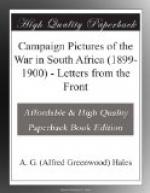Then once again the pipes pealed out, and “Lochaber No More” cut through the stillness like a cry of pain, until one could almost hear the widow in her Highland home moaning for the soldier she would welcome back no more. Then, as if touched by the magic of one thought, the soldiers turned their tear-damp eyes from the still form in the shallow grave towards the heights where Cronje, the “lion of Africa,” and his soldiers stood. Then every cheek flushed crimson, and the strong jaws set like steel, and the veins on the hands that clasped the rifle barrels swelled almost to bursting with the fervour of the grip, and that look from those silent, armed men spoke more eloquently than ever spoke the tongues of orators. For on each frowning face the spirit of vengeance sat, and each sparkling eye asked silently for blood. God help the Boers when next the Highland pibroch sounds! God rest the Boers’ souls when the Highland bayonets charge, for neither death, nor hell, nor things above, nor things below, will hold the Scots back from their blood feud. At the head of the grave, at the point nearest the enemy, the General was laid to sleep, his officers grouped around him, whilst in line behind him his soldiers were laid in a double row, wrapped in their blankets. No shots were fired over the dead men resting so peacefully, only the salute was given, and then the men marched campwards as the darkness of an African night rolled over the far-stretching breadth of the veldt. To the gentlewoman who bears their General’s name the Highland Brigade sends its deepest sympathy. To the mothers and the wives, the sisters and the sweethearts, in cottage home by hillside and glen they send their love and good wishes—sad will their Christmas be, sadder the new year. Yet, enshrined in every womanly heart, from Queen Empress to cottage girl, let their memory lie, the memory of the men of the Highland Brigade who died at Magersfontein.
SCOUTS AND SCOUTING.
DRISCOLL, KING OF SCOUTS.
ORANGE RIVER COLONY.
I have a weakness for scouts. Good scouts seem to me to be of more importance to an army in the field than all the tape-tied intelligence officers out of Hades. They don’t get on well with the regular officers as a rule, because scouts are like poets—they are born, not manufactured. They are people who do not feel as if God had forsaken them for ever if they don’t get a shave and a clean shirt every morning, they are just a trifle rough in their appearance and manners; but they ride as straight as they talk, and shoot straighter than they ride. They have to be built for the business. All the training in the world won’t make a scout unless nature has commenced the job; mere pluck is not worth a dog’s bark in this line of life, though without pluck no scout is worth a wanton woman’s smile. A good scout wants any amount of courage; he wants a level head—a head of ice, and a heart of fire. He wants to know by instinct when to rush onward and chance his life to the heels of his horse and the goodness of God, and he wants to know with unfailing certainty when to crawl into cover and hide. He must understand how to ride with no other guide than the lay of the country, the course of the sun, or the position of the stars. He must have eyes that note every broken hill, every little hollow, every footprint of man or horse on the veldt.




